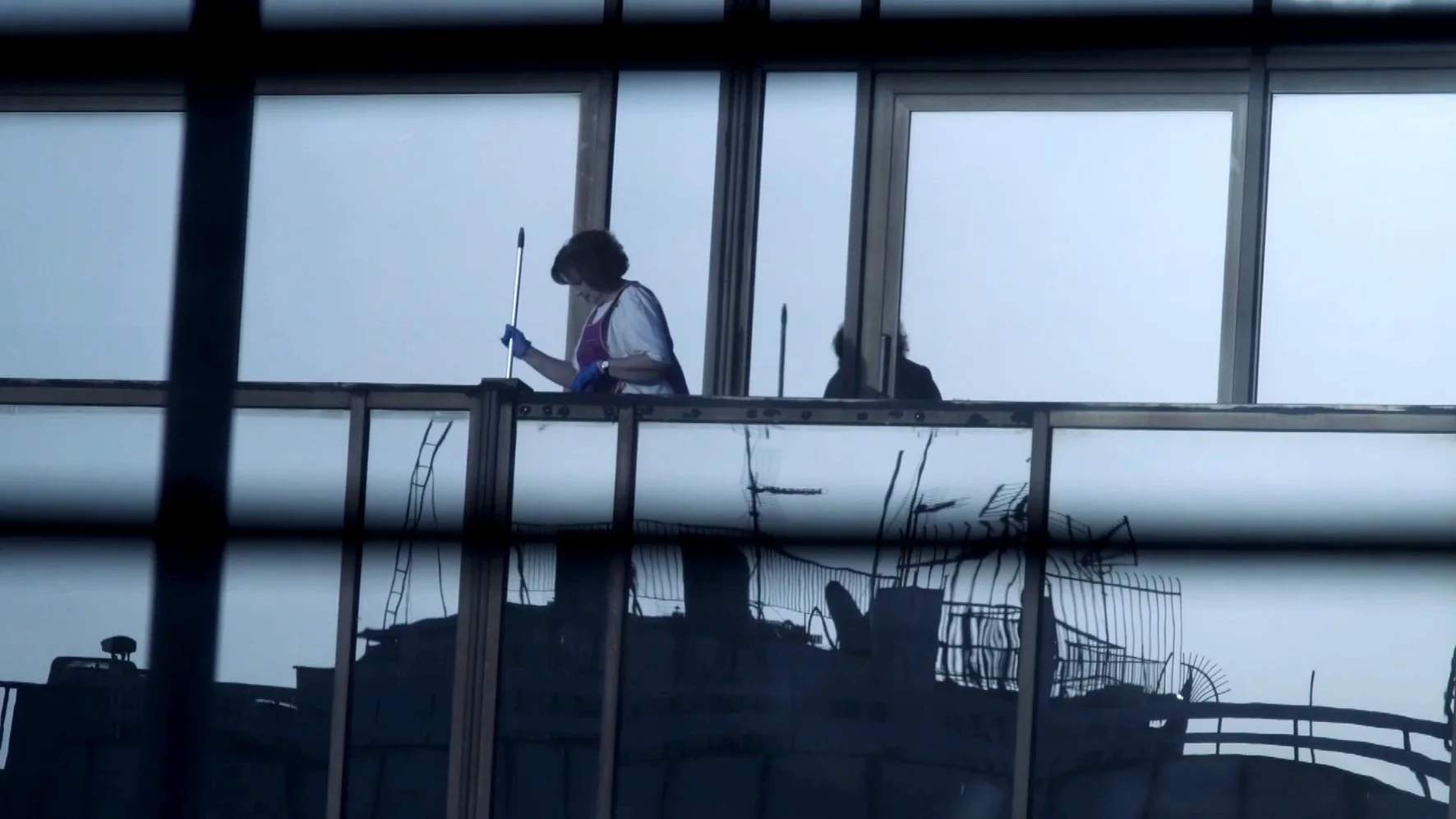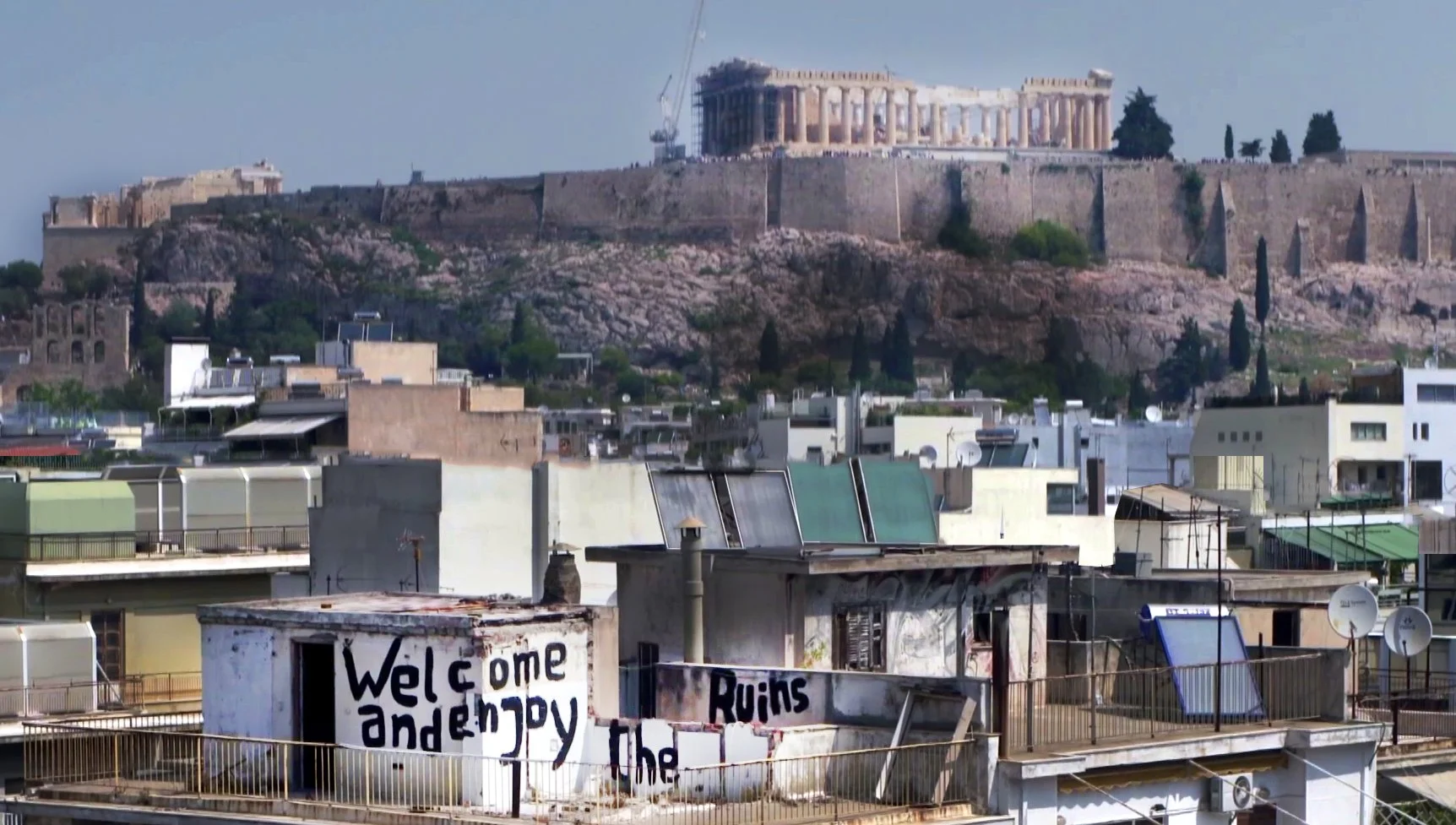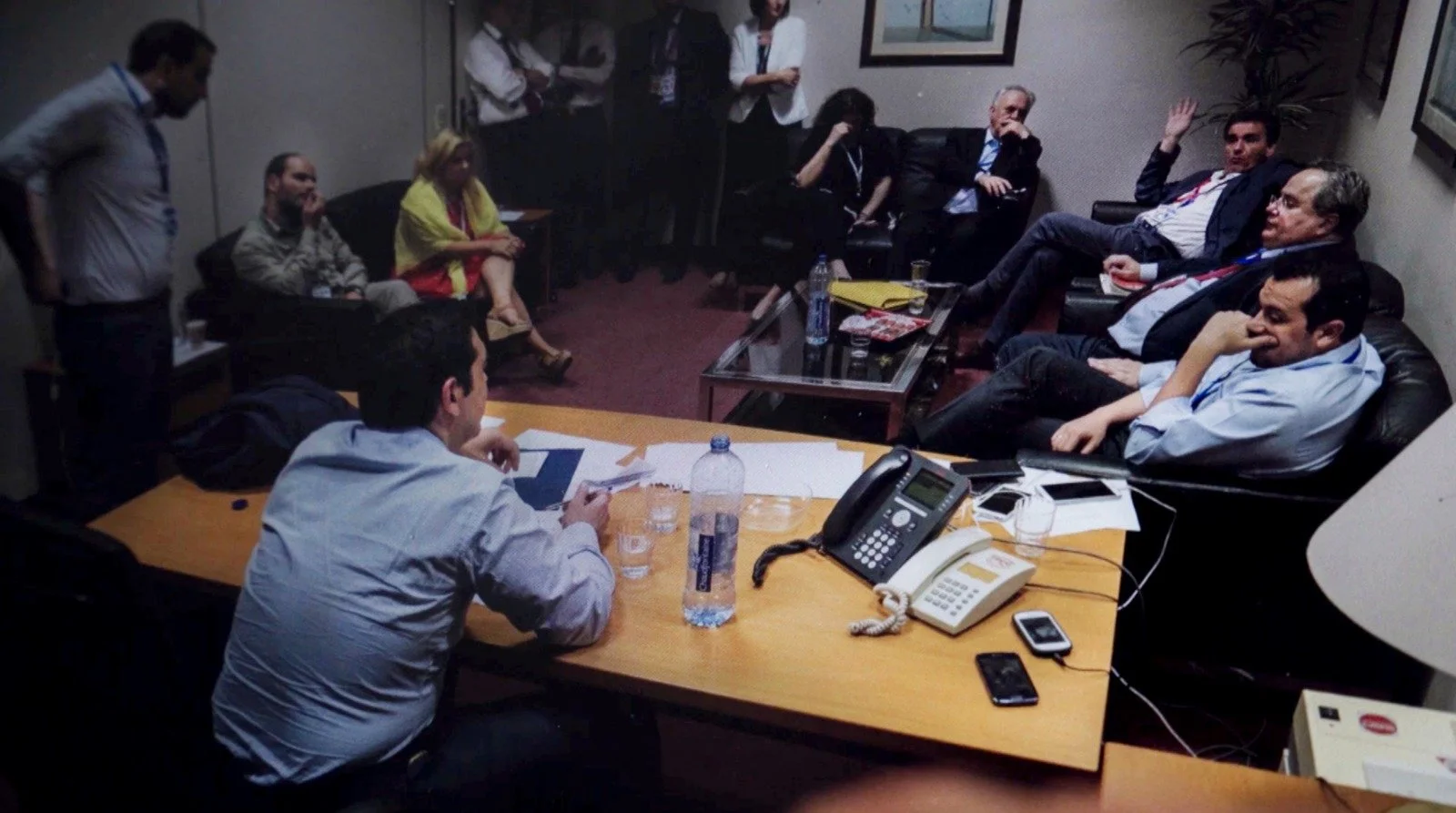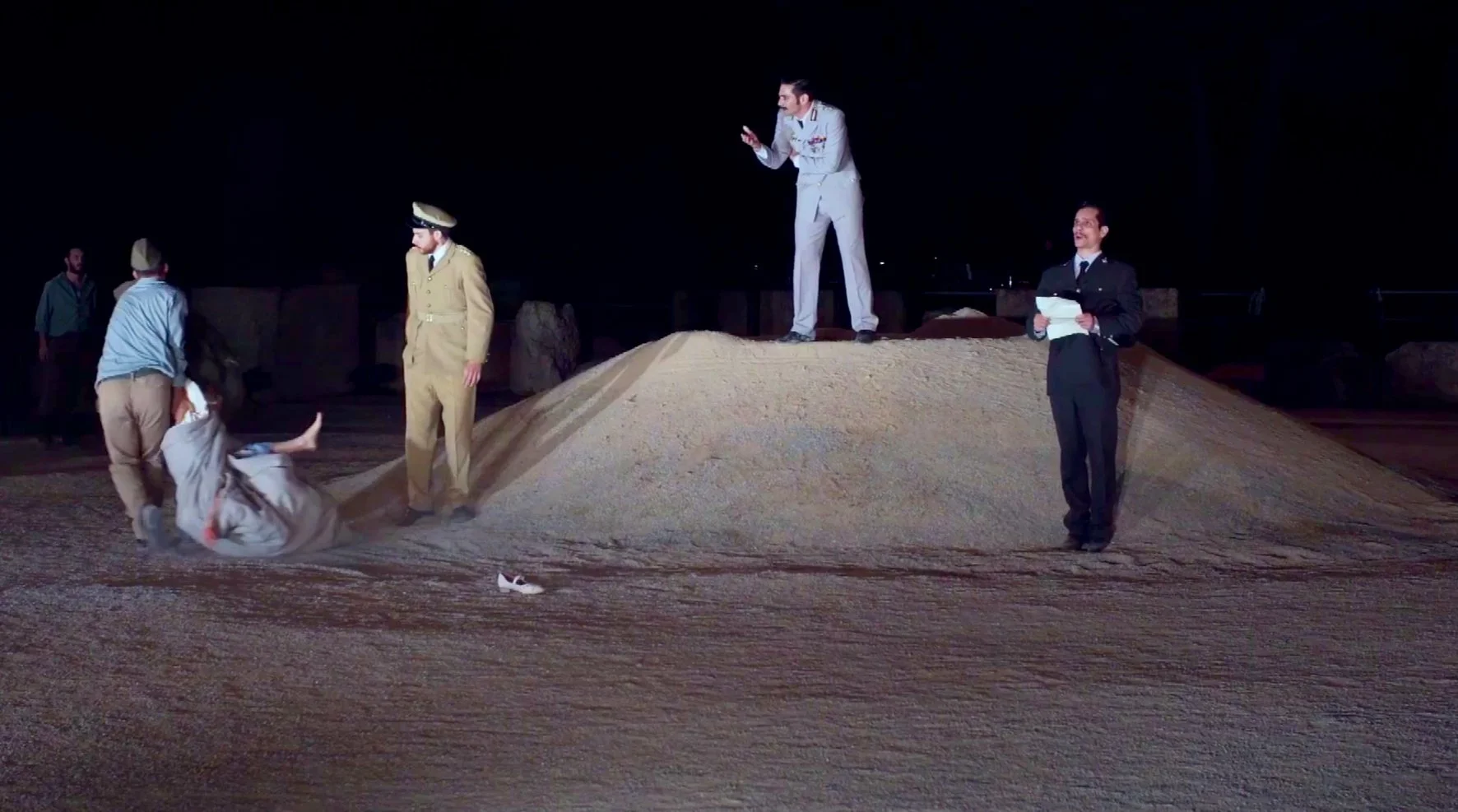Public Enemy: A GreekTragedy
By Holly Styles
24 September 2024
“Silence is the greatest ally of the crime that is being perpetrated.”
— Yanis Varoufakis
Between 2010 and 2019, due to economic mismanagement by the government, its membership in the Eurozone, and the global Great Recession, Greece suffered a debt crisis like no other. The upcoming release from eXeFilm, Public Enemy, is a cautionary tale about this turbulent period in the country’s history.
Yanis Varoufakis, Greece’s Finance Minister in 2015, said in an interview with Exeter University academic Ilan Pappe: ‘silence is the greatest ally of the crime that is being perpetrated.’ Throughout the film, we see an array of people using their voices and specifically their art to speak up about current political issues. The singer and performer Despina Xenou states in the film that art has always been a way to say something, no matter where you are or what the circumstance, which we can all recall from the pandemic, with painting, film, music and literature providing many with an outlet for reflection during a time of crisis.
Public Enemy was directed by Elisa Mantin and features Yanis Varoufakis, Francoise Hollande, Enki Bilal, and Paul Mason, among commentary from many others, including archival footage of former Greek Prime Minister Alexis Tsipras (2015-2019). The film offers an insider’s viewpoint of the economic crisis, with Yanis Varoufakis providing a commentary on his experience as the Greek Finance Minister between January and July of 2015. The documentary depicts how Greece became the public enemy and the controversial approaches of Yanis Varoufakis as finance minister. However, it is not just a story about Greece but a universal tale of the abuses of power within government and the endurance of art within such crises.
The artwork of Enki Bilal opens and closes the film, with the image of Earth accompanied by the powerful statement:
I was born in former Yugoslavia, Greece’s neighbour. A country that was left to implode into war. I wish the constant failure of memory would end and the bloodshed would stop, so that our planet, which looks blue from above, will not turn red.
Through this brief yet powerful statement, Bilal uses his artwork to break the silence surrounding the crisis and its impact on the Greek public, with the suggestion that the human race never seems to learn from its mistakes.
Another key art installation featured in the film is by Danae Stratou and called Upon Earth Under the Clouds. Stratou’s work consistently explores ideas of space and a human’s place within it, a theme continued in this exhibit. The installation was located at the Old Oil Mill Factory in Eleusis between June and November of 2023. It is made up of 1,000 handmade ceramic pots that are filled with water to reflect the sky above. Their placement encourages the visitor to follow their pathway and explore the site which leads them to the seafront and from above appears like a group of people moving in the same direction; a community on the same path. Stratou has said that the pots are symbols of freedom, salvation, and hope, denoting the experience of migrants arriving in Greece. Art is a way to say something about one’s circumstance and the installation by Stratou seems to suggest an empathy for others in a country vilified for its debt crisis.
The documentary’s roots in Greek tragedy are evident by the location of Eleusis being linked to the myth of Demeter and Persephone. The myth follows Demeter, the Goddess of agriculture, and her daughter Persephone, who become separated when Hades, the God of the dead, kidnaps Persephone to marry her. It is a tale of deceit, love, and change. Persephone surprisingly embraces her new role as Queen of the underworld and falls in love with Hades yet returns to Earth every Spring to see her mother. These myths are so engrained in culture that the changing seasons are said to reflect the time that Demeter and Persephone spent apart. During the time when Persephone is with her husband, Demeter’s despair results in the Earth dying, which is why we have Autumn and Winter. When reunited, Earth is reborn and renewed, representing Spring and Summer. Mythological stories explore the human experience and understanding of the world, which is why they have endured. During the economic crisis, it was not only the economy and democracy of the nation that suffered; it was the cultural legacy of Greece too. That is why the art of Danae Stratou, Enki Bilalal and many more are so significant to this documentary, as their art reminds us of this cultural legacy that must not be lost. The artwork that followed the debt crisis seems to suggest a sense of hope and empathy for the community, with Stratou’s representation of human bodies moving in the same direction, evoking not only the desperation of Syrian migrants arriving in Greece throughout 2015 but perhaps the Greek people coming together to find hope in times of sorrow.
Ersi Sotripoulos, a writer featured in the film, states that, ‘crisis breeds apathy’, and the world eventually writes off historical events in favour of forgetting or ignoring them. To make matters worse, the debt crisis resulted in a binary of “good” and “bad” Europeans, as journalist Paul Mason states in the documentary. It was not only the Greek economy and democracy that was impacted during the crisis, but the cultural legacy of Greece was attacked too. Public Enemy allows not only former government officials and journalists to comment on the matter but the general public too, with artists like Depsina Xenou.
One scene in the documentary is set within a bar where people are singing and enjoying themselves, and this is where we meet the singer, Despina Xenou. I think that Despina Xenou said it best when she said that in every country, no matter where or what the situation, ‘art was a way to say something’. By including artists within this film, this economic thriller seems to come alive with the raging heart of the Greek nation at its center.
As we near the end of 2024, we are all aware of the violence and war being perpetrated around the world. This is why films like Public Enemy are so important today, as they show us that art is a way to say something, and that cinema can be a tool for global change.
Public Enemy is released theatrically on the 24th of September in select cinemas.
If you are interested in exploring this topic further, see the following:
YouTube Video, A Conversation with Yanis Varoufakis and Ilan Pappe, published by the University of Exeter on the 12th of May 2021
The work of Dimitris Plantzos in the journal, Social Science Information, with an article called ‘We owe ourselves to debt: Classical Greece, Athens in crisis, and the body as battlefield.’
Work by Adam Tooze:
Reading Varoufakis: Frustrated Strategist of Greek Financial Deterrence.
Chartbook #111: What about Greece? Charting a future beyond the debt crisis.
Stay tuned for more information about Public Enemy.
















